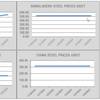The world's principal shipbuilding economies have launched negotiations at the Organization for Economic Cooperation and Development (OECD) on ways to counter over-capacity and plunging prices in the ailing world shipbuilding industry.
Current levels of over-capacity, estimated at around 15 percent, are largely the result of subsidies and other forms of government support measures that have allowed shipyards that would otherwise have gone bankrupt to continue to operate. The result has been to push new ship prices to artificially low levels, as many shipyards reduce their prices to below economic levels in order to attract the business needed to keep their workforces employed.
Without action to counter this trend, over-capacity in the shipbuilding industry is likely to rise to more than 30 percent over the next two years, according to OECD estimates. Faced with this prospect, governments and industry in both OECD and non-OECD economies have agreed that there is an urgent need to establish normal competitive conditions in the world's shipbuilding industry.
In pursuit of this objective, a Special Negotiating Group chaired by Switzerland's Ambassador to the OECD, Wilhelm B. Jaggi, hold its first meeting at the OECD on December 5-6, with the participation on an equal footing with OECD members of a number of non-OECD economies -- Brazil, China, Croatia, Romania, the Russian Federation, Chinese Taipei and Ukraine -- with important shipbuilding capacities. Together, the OECD and these non-OECD economies account for more than 95 percent of total world shipbuilding production.
In an opening statement, Ambassador Jaggi urged all participants to remain flexible and open to proposals during the negotiations, with the objective of eventually concluding an instrument that would have the greatest chance of entering into force.
Following discussions at the first meeting of the Special Negotiating Group of the basic structure of a possible new Agreement, future meetings will discuss mechanisms to deal with subsidies and other support measures, disciplines to address pricing and other practices that distort the market, and eventually remedies and dispute settlement procedures. The next meeting of the Special Negotiating Group is expected to take place in early March 2003. It hopes to conclude its work by the end of 2005.
Sponsored Content
Innovative Hull Maintenance: Profitable & Green

Subscribe for
Maritime Reporter E-News
Maritime Reporter E-News is the maritime industry's largest circulation and most authoritative ENews Service, delivered to your Email five times per week












